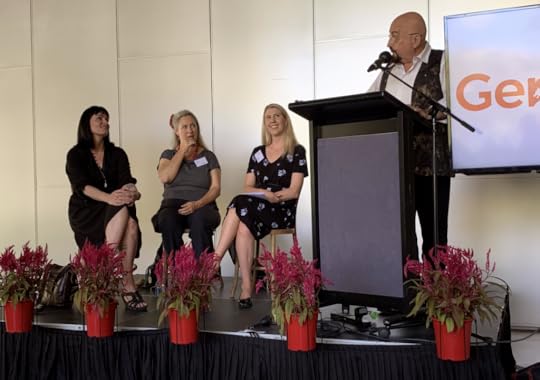The Shreader
 I’m feeling bad because I didn’t write down the names of the people doing the Shreader, and I can only name three of them. From left to right–Kim Wilkins, author, Sue Wright, editor and publisher, and Justine Barker, agent. I can’t put a name to the the convenor, sorry, but he read the manuscripts. If anyone can identify him, let me know in the comments.
I’m feeling bad because I didn’t write down the names of the people doing the Shreader, and I can only name three of them. From left to right–Kim Wilkins, author, Sue Wright, editor and publisher, and Justine Barker, agent. I can’t put a name to the the convenor, sorry, but he read the manuscripts. If anyone can identify him, let me know in the comments.Another GenreCon has been and gone. It was a lot of fun, with some stand-out sessions.
The conference was two weeks after Sherylyn and I ran an
editing session down here in Melbourne, and some sessions particularly made an
impact because I was still thinking about the course.
The Shreader
One session I want to talk about is the Shreader, where ten
brave souls submitted the first two pages of their manuscript to an author, an
agent and an editor, and they decided whether they’d read more or pass (shred).
It takes courage to put yourself out in public like that,
even when you’re a published author with an editor and an agent behind you. For
newbies, who don’t even have that experience behind them, it can be a raw
experience. It’s one I’d recommend,
however, if you think you can take it.
As newbie writers we put our work out there and want praise.
What we need, however, is constructive feedback. We also need the
ability to listen to that feedback, the thick skin that comes from experience
of being critiqued. It allows us to dissociate ourselves from the work being considered—mostly,
anyway.
The Shreader is a harsh way to get this feedback, but it’s real
life, and if you can face something like the Shreader and get value out of it,
you’re levelling up as a writer. Good on you.
My two cents
The writing was good in all samples, but only four made it past
the shredder.
You got a hint of how different stories appeal to different people, with those on the stage who liked fantasy showing more interest in the fantasy offerings, and—I think it was the agent, who specialised in children’s and young adult fiction—showing more interest in a story that was likely to be young adult. I found this myself, as I listened. Whilst the samples were all well-written there was only that caught my interest enough to want to read more.
It’s like picking up books in a library. I borrow roughly one in ten of those I read the blurb on.
I would say that for me many of stories felt as if they started
too early. They also contained a lot of backstory. One of the things we touched
on in the course we ran two weeks earlier was infodumps, so I was still very
aware of how much backstory slows down the narrative, particularly in the first
few pages, where you’re trying to capture the reader’s attention.
Resonating with Theme
The other session was Rob Porteous’ Resonating with Theme.
In this session, Rob talked about his years of judging the
Aurealis awards. I’m working from memory here, because I didn’t write it down,
but Rob said that the stories he judged were mostly well written, and 80% of
them started off with a great idea. However, few of them carried through on the
promise of the story.
It came immediately after The Shreader, and the two sessions
seemed to cover a theme. Not Rob’s theme, which was about putting a theme into
your story, but a thread of how you can write well, and have great ideas but
still not be quite there.
When it is there, however, that’s when the magic happens.



